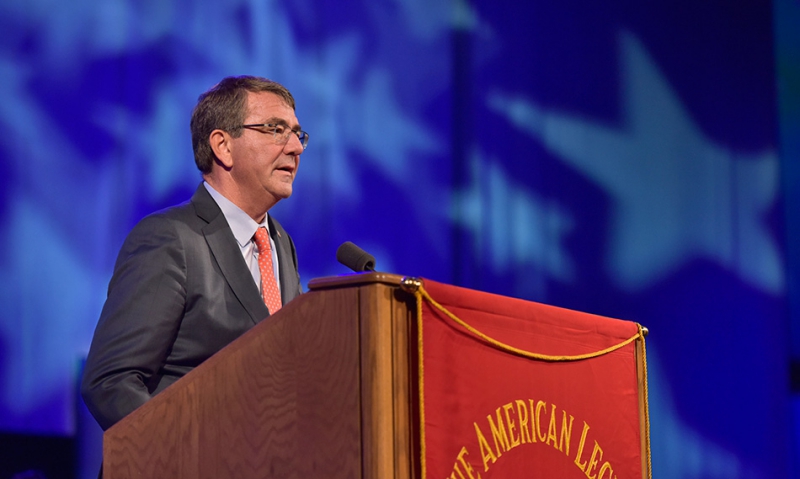
Department of Defense secretary tells national convention: If you threaten American lives, you will answer for it – no matter what it takes.'
Department of Defense Secretary Ashton Carter stressed on Tuesday that the United States never wants to go to war when issues arise with foreign countries. But Carter told delegates to the 97th American Legion National Convention that if there is no other option, the U.S. military is ready to take the necessary steps.
“We want peaceful solutions to all disputes,” Carter told Legionnaires in Baltimore. “But let me be clear: The United States will fly, sail and operate wherever international law allows, as we do all around the world. No matter the circumstances ... the bottom line is this: Those who wish to do us harm will never find safe haven. If you threaten American lives, you will answer for it – no matter what it takes."
Carter specifically referenced situations going on in both Europe and the Middle East.
“We do not seek to make Russia an enemy,” he said. “But make no mistake: while Vladimir Putin may be intent on turning the clock back in Russia, he cannot turn the clock back in Europe. We will defend our allies ... we will defend a rules-based international order, and we will defend the positive future that affords us.”
Calling the situation in the Middle East “complex,” Carter said the United States is focused on protecting its interests and allies, and defending U.S citizens.
“First, we will deliver a lasting defeat to ISIL,” Carter said. “With a global coalition of some 60 nations, we’re taking the fight to ISIL across the physical, virtual and ideological battle space as it requires. Our coalition has conducted over 6,500 airstrikes, severely hampering ISIL’s movement and operations and systematically eliminating this evil group’s leadership.
“Dealing ISIL a lasting defeat means that there must be capable, motivated, local forces on the ground to sustain the defeat. Otherwise we know from experience that ISIL will be defeated, but then five years, 10 years later, something like it will be back. The coalition and us, we can support such local forces, but we can’t substitute for them.”
Shifting to Iran, Carter said the nuclear deal is, “a good deal, because once implemented, it will remove a critical source of risk and uncertainty in an important but tumultuous region: Iran’s ability to obtain a nuclear weapon. But while the deal puts limits on Iran, the point I want to make is the deal places no limits whatsoever on our military and our military option is real and will remain real. We will continue to protect our friends in the region, especially Israel, from Iran’s destabilizing activities.”
But Carter said that any military action needs to be completely justified because of those who will be asked to carry it out. “Our great responsibility is to make sure we never put a single one of America’s brave sons or daughters, or their families, in harm’s way without the greatest care and reflection about why we’re doing it and how it benefits our nation,” he said.
Carter said those same men and women deserve the best technology and best strategies – both of which require budget certainty. “Our troops need the best training, the newest equipment and the right compensation,” he said. “For too long, we’ve been forced to make painful tradeoffs, often on short notice, critically undermining our mission. Our troops deserve better than the inadequacy of quick-fixes and one year, every year crisis budgeting.
“Indiscriminate cuts from sequestration are wasteful for taxpayers, dangerous for our strategy, unfair for our troops and, frankly, embarrassing in front of the world. We need to come together behind a multi-year approach to our budgeting.”
Servicemembers transitioning out of the military now have more options, Carter said, in part because of Legion efforts. “Thanks to the Legion’s help, we’ve established a credentialing and licensing program to give servicemembers credit where it’s due,” he said. “Because if you're certified to drive a truck or provide medical attention in a war zone, you shouldn’t have to get re-certified back home.”
Carter closed by praising the men and women serving this nation and the opportunity for both to succeed in their military careers. He spoke of speaking with Capt. Kristen Griest and 1st Lt. Shaye Haver, who became the first two women to earn the Ranger Tab,
“But these two women are more than a snapshot of the strength of our current force; they represent a broader future trend where a strategy of attracting the best and staying the best means we keep pace with change and open ourselves to the talents and strengths of all Americans who can contribute with excellence to our force,” Carter said. “When put to the test, not everyone – not everyone, only a select few – will meet our standards of combat excellence. But no one needs to be barred from their chance to be tested. That’s just one way we’re evolving to retain our place as the finest fighting force the world has ever known.
“To stay the best, we must keep our focus on our greatest strength, our people, caring for those who serve, and pursuing a strategy suited for this century, in building the force of the future. If we do right by our people, with thought and commitment and openness and honor…then tomorrow’s veterans will be as good as today’s and America’s security will be assured for generations to come.”
- Security

